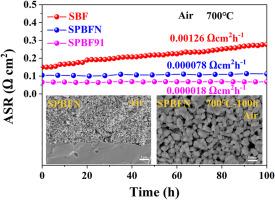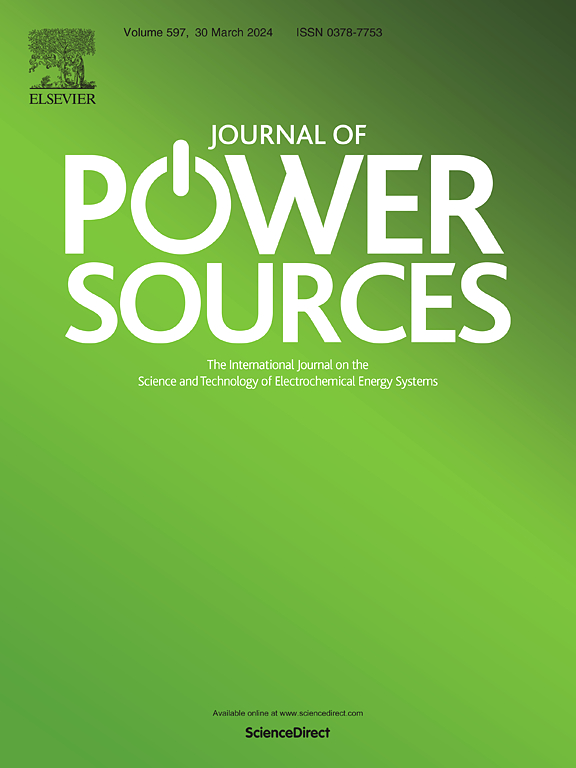Investigate the symmetrical electrode material based on Pr and Ni doping SmBaFe2O5+δ for its electrochemical and stability performance for solid oxide cell
IF 8.1
2区 工程技术
Q1 CHEMISTRY, PHYSICAL
引用次数: 0
Abstract
Symmetrical solid oxide cell (SSOC) that uses the same electrode material for both oxygen electrode and fuel electrode can simplify the preparation process and enhance the durability of the cell. In this study, the Pr and Ni doped SmBaFe2O5+δ (SBF), Sm0.9Pr0.1BaFe2O5+δ (SPBF91) and Sm0.9Pr0.1BaFe1.6Ni0.4O5+δ (SPBFN) as symmetrical electrodes for SSOC are successfully prepared, and their properties are investigated. First principles calculation indicates that the oxygen vacancy formation energy of SPBF91 (2.24 eV), SPBFN (1.76 eV) is lower than that of SBF (2.49 eV). In addition, the doping of Pr and Ni significantly reduces the band center energy of Fe-3d and O-2p in SPBFN, which is conducive to oxygen ion and charge transfer. At 800 °C, the polarization resistance of SPBFN are 0.025 Ωcm2, and 0.11 Ωcm2 in air and H2, respectively. At 800 °C, using H2, CH3OH, and wet C3H8 as fuel, the maximum power density (MPD) of fuel cell with SPBFN as a symmetrical electrode reaches 850, 651 and 648 mWcm−2, respectively. The FeNi alloy is observed on the SPBFN surface at fuel electrode side. The FeNi alloy on SPBFN surface significantly improves the output performance and stability of symmetrical electrode. Furthermore, the solid oxide electrolysis cell (SOEC) with PBSFN as a symmetrical electrode exhibits good stability during a 200 h test when electrolyzing H2-50%H2O and electrolysis CO2.

研究基于掺杂 Pr 和 Ni 的 SmBaFe2O5+δ 对称电极材料在固体氧化物电池中的电化学和稳定性能
对称固态氧化物电池(SSOC)的氧电极和燃料电极使用相同的电极材料,可简化制备过程并提高电池的耐用性。本研究成功制备了掺杂 Pr 和 Ni 的 SmBaFe2O5+δ (SBF)、Sm0.9Pr0.1BaFe2O5+δ (SPBF91) 和 Sm0.9Pr0.1BaFe1.6Ni0.4O5+δ (SPBFN),并对其性能进行了研究。第一性原理计算表明,SPBF91(2.24 eV)和 SPBFN(1.76 eV)的氧空位形成能低于 SBF(2.49 eV)。此外,Pr 和 Ni 的掺杂大大降低了 SPBFN 中 Fe-3d 和 O-2p 的能带中心能,有利于氧离子和电荷转移。在 800 ℃ 时,SPBFN 在空气和 H2 中的极化电阻分别为 0.025 Ωcm2 和 0.11 Ωcm2。在 800 ℃ 条件下,以 H2、CH3OH 和湿 C3H8 为燃料,以 SPBFN 为对称电极的燃料电池的最大功率密度(MPD)分别达到 850、651 和 648 mWcm-2。在燃料电极一侧的 SPBFN 表面可以观察到铁镍合金。SPBFN 表面的铁镍合金显著提高了对称电极的输出性能和稳定性。此外,以 PBSFN 为对称电极的固体氧化物电解池(SOEC)在电解 H2-50%H2O 和电解 CO2 的 200 小时试验中表现出良好的稳定性。
本文章由计算机程序翻译,如有差异,请以英文原文为准。
求助全文
约1分钟内获得全文
求助全文
来源期刊

Journal of Power Sources
工程技术-电化学
CiteScore
16.40
自引率
6.50%
发文量
1249
审稿时长
36 days
期刊介绍:
The Journal of Power Sources is a publication catering to researchers and technologists interested in various aspects of the science, technology, and applications of electrochemical power sources. It covers original research and reviews on primary and secondary batteries, fuel cells, supercapacitors, and photo-electrochemical cells.
Topics considered include the research, development and applications of nanomaterials and novel componentry for these devices. Examples of applications of these electrochemical power sources include:
• Portable electronics
• Electric and Hybrid Electric Vehicles
• Uninterruptible Power Supply (UPS) systems
• Storage of renewable energy
• Satellites and deep space probes
• Boats and ships, drones and aircrafts
• Wearable energy storage systems
 求助内容:
求助内容: 应助结果提醒方式:
应助结果提醒方式:


